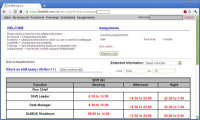Service Tasks
On this page the service tasks which are currently the group's responsability inside the LHCb Collaboration are described in detail.
Management and Publication of Event Generator Statistics
This activity, taken over by our group around 2013, is currently part Work Package (WP)-P of the Simulation project of the LHCb collaboration. Our group is involved in this activity at least for the 2 years (starting November, 2021). The tasks include the maintenance of scripts used to retrieve statistical data associated with the official MC productions of the collaboration and their publishing on the web for the use of the whole LHCb physics community. Furthermore, for the coming year, the goal includes also the commissioning of saving generator information in production from the Generator File Summary Record (GenFSR) structure of the MC event model. The role associated with these tasks is completely fulfilled by one member of our group consisting in the actual management of the non-relational database containing the information and its publishing on the web.
MC validation & service work
- As of 2021, our group's activities in WP-G of the newly established Simulation LHCb project include the maintenance and use of the LbRivetPlugins package for event generator tuning (for a period of at least 2 years). Given the close link between the RIVET analysis modules and the data sets exposed publicly through the HepData portal, there are two roles associated with this task: RIVET plugin manager and HepData experiment coordinator. While the first role includes also a default reponsibility of managing the internal collaboration validation and further release of new analysis modules in the official RIVET library, the latter role may also be considered as part of the outreach activity of the LHCb collaboration at LHC, CERN (collaboration measurements are prepared to be made publicly available for use by the HEP community in theory or MC validation and tuning).
- Our group developed an interface between the RIVET library and the LHCb simulation software package (GAUSS). This work was mainly done in late summer of 2011 in close collaboration with members of LPCC. The main goal of this task is to allow the members of the LHCb collaboration to write RIVET plugins for published papers and thus contribute to the results published on MCPLOTS.
- Members of LHCb-RO currently (Nov. 2011) work on the integration of the PYTHIA 8 Monte Carlo generator into the LHCb framework.
- A series of existing MC tunes were implemented in GAUSS and work is on going on implementing LHCb specific tunes; for some of these tunes we will use the Professor/RIVET tuning toolkit.
-
A new GAUSS package Gen/GenTune was developed and is being maintained by the group for purposes of MC generator validation and tuning, but also allowing faster development of RIVET plugins for the collaboration physics analyses.
As part of this task, our group currently provides support for managing integration of LHCb published results in HepData reaction data base.
LHCb@HepData - Some of our members are active in the LHCb Production & Spectroscopy working group at CERN. As such, their responsibility is to participate at validation studies of various MC tunes and production data samples when new versions of the LHCb simulation software packages are released.
- As of autumn 2013, one of the members of our group is directly responsible for the production of MC samples for the analyses performed in the QEE (QCD Electroweak Exotica) working group (WG) at LHCb. Also another member became convener of the Soft QCD sub-group within the same QEE WG for a mandate of 2 years. Since 2015 the convener tasks were taken over by another member of the group for a mandate of 2 years.
Support for GRID Tier-2 sites

2 Romanian Tier-2 GRID sites running jobs for LHCb Virtual Organization (VO):
- LCG.NIPNE-07.RO - site used by more VOs among which also LHCb VO
- LCG.NIPNE-11.RO - site dedicated to running LHCb VO jobs
ShiftDB
- Dedicated Web application for shift management at LHCb;
- Romanian responsibility since 2007;
- New improved variant, following the user feed-back, released recently (2010);
- Continuous technical support and maintenance (through-out LHC Run 2 with growing involvement of LHCb members);
- For LHC Run 3 (and foreseeable future,) a new the web application was released by LHCb Computing work group.



